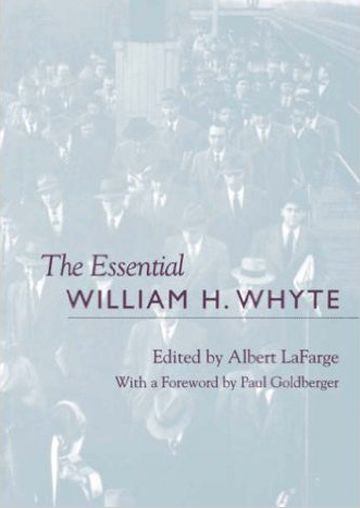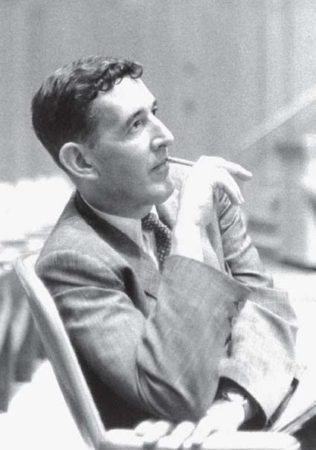The Essential William H. Whyte
Edited by Albert LaFarge with a foreword by Paul Goldberger
Now in paperback and e-book editions.
The Essential William H. Whyte offers the core writings of a great observer of the postwar American scene. Included are selections from The Organization Man (1956), Securing Space for Urban America: Conservation Easements (1959), The Last Landscape (1968), The Social Life of Urban Spaces (1980), and City: Rediscovering the Center (1988), as well as many of Whyte’s groundbreaking articles in Fortune magazine.
Reviews
“This sizable, deftly edited, and discreetly annotated sampling of [Whyte’s] provocative and humane work, drawing from both his articles and his books, reminds us just how essential a figure William Whyte has become.” —Richard E. Nicholls, Preservation
“LaFarge has pulled together a first-rate collection of modern American social criticism.” —Library Journal
“A very fine collection . . . Whyte’s writings are testaments to human possibility, a theme he pursued as a passionate reformer, common-sensical thinker, and clear writer–all of these qualities are wonderfully present here. We are indebted to Albert LaFarge for this finely edited synopsis of The Essential William H. Whyte.” —Thomas Bender, University Professor of the Humanities, New York University
“No one in the last half-century has better understood—and explained—the dynamics of American urban life than William H. Whyte. He was above all an advocate of shaping urban spaces to work for people, and there’s no question that our cities would be infinitely better off if we had paid greater attention to his accumulated wisdom. Happily, thanks to this wonderful new collection of his writings, we have another chance.” —Richard Moe, president, National Trust for Historic Preservation
“William Whyte saw, listened, processed and translated twentieth century American culture better than any person I have known. Sliding in and out of The Essential William H. Whyte is a complete pleasure, from his pithy deconstructs on the evolution of Corporate America, to his funny and subversive views of what makes cities tick. His work has been used to make public spaces better and more useful to citizens, which in turn has made cities better. Editor Albert LaFarge has done a wonderful job cherry-picking through Whyte’s material.” —Paco Underhill, author of Why We Buy
“William H. Whyte’s studies of how people use parks made him something of a philosopher-king of public space. Every time I think I’ve had an idea about cities and streets and how they work, I look back and discover that Holly saw it first. He taught all of us, more than anything, to look, to look hard, with a clean, clear mind, and then to look again – and to believe in what you see. That is the first of his lessons, and the one that informs all the others. Believe in what you see, and believe in the fact that the people who use cities are often way ahead of the people who design them – that is what Holly Whyte taught us all, and what was central to his passion for civic engagement, for community and for the enlightenment of urban life.” —Paul Goldberger (from the foreword)
“Whenever I read Whyte I would nod along in agreement, wondering inwardly when his vast tolerance and understanding would show a darker side. The guy seemed too good to be true. So I leapt at the chance to review this collection of his core writings, to get to the bottom of Whyte—maybe to ferret out that individual psychopathology that Nietzsche assures us is at the heart of every philosophy. After exposure to the full range of his career, I am ready to start canonization proceedings. We so rarely encounter such consistent moral wisdom, common sense, patience, modesty, and quiet humor in to-day’s public discourse that the tone seems almost from another planet. Yet Whyte is a very American kind of saint, rooted in material facts and the democratic quotidian, with affinities to Walt Whitman, John Dewey, William James, and Dorothy Day. […] He remained hopeful to the last—one does not turn to Holly Whyte for Spenglerian gloom. This saintly man can be forgiven, if that’s the word, his sprightly optimism, his acceptance or even embrace of imperfection, in his books as well as on the streets, because he was always clear-eyed and never duped. And, because Whyte was less a writer of tomes than of articles and essays, it is all the more useful to have this collection of his best pieces, assembled from magazines and excerpted from his books. Its title, The Essential William H. Whyte, can be read in a double sense: this volume provides the gist of his thinking and reminds us what an indispensable resource his work remains in the struggle to make our environment better.” —Philip Lopate, Metropolis

